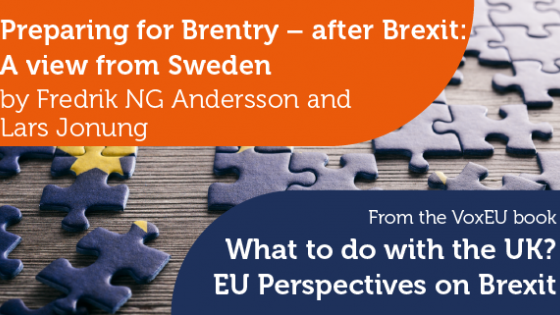Editor's note: This column first appeared as a chapter in the VoxEU eBook, What To Do With the UK? EU perspectives on Brexit, available to download here.
Sweden joined the EU in 1995 after a major financial crisis in the early 1990s. At that time, EU membership helped Sweden improve its economic performance and contributed to two decades of rapid economic growth and rising exports. The UK is a key economic and political partner to Sweden in the EU. It is Sweden’s fifth largest trading partner in goods, second largest trading partner in services, and the third largest investor in Sweden.1 Politically, Sweden and the UK have often formed coalitions to push for market-oriented reforms to enhance the EU’s economic performance (Keading and Selck 2005, Hayes-Renshaw et al. 2006).
A close partnership at risk
Brexit puts this close partnership at risk, with clear negative economic and political consequences for Sweden. Limiting the damage from Brexit by keeping the UK as close as possible to the EU is clearly in the interest of Sweden. In our view, Sweden should work for a happy divorce that lays the foundation for a remarriage. In other words, we hope that Brexit will be followed by ‘Brentry’ – the return of the UK to the Union in the future.
Specifically, Sweden should aim to keep the UK in the common market and to maintain as close political links with the UK as possible. A ‘hard’ Brexit should be avoided. We believe this is possible by offering the UK, as well as all other member states, the explicit right to impose well-defined and temporary restrictions on the free movement of labour. Naturally, the right to limit migration comes coupled with the obligation for the UK to honour all of its other obligations, including paying into the EU budget.
Migration – not just a UK issue
We arrive at this proposal because migration was one of the key issues in the UK referendum campaign.2 The referendum outcome was sufficiently close that the result could easily have been the opposite had the UK been allowed to impose controls on the flow of EU migrants that were perceived as effective by the electorate. The UK population has grown by almost 8% in a decade, mostly from immigration. Public concern about migration has increased with the rising number of migrants, and it has been a major political issue in several recent general election campaigns (Cowley and Kavanagh 2010, 2015).
People’s concerns about migration are not unfounded. Empirical research shows that the effects of migration on the host country are seldom unequivocally favourable. Often some parts of society gain from migration while others lose, at least in the short run. Migration of skilled labour can contribute greatly to economic growth by filling vacancies, bringing in new ideas, or helping firms to open up new export markets. Migration can also cause negative effects such as lowering social trust (Alesina and La Ferrara 2002, Putnam 2007), reducing wages, and putting pressure on housing and public services.
In terms of skills, roughly half of EU migrants to the UK are highly skilled (Nickell and Salaheen 2015). EU migration has benefited some parts of the UK – such as the London area – greatly, contributing to London’s economic success (McWilliams 2015). In other areas the effects have been the opposite, with a heavy pressure on wages, housing and public services. The EU referendum in part reflected the split between communities that have benefitted from migration and those that have suffered.
The UK is not the only EU member in which EU migration is a crucial political issue. A recent Eurobarometer survey found that 45% of respondents in Italy hold a negative or very negative view of EU migration, the same level as in the UK. In France and Germany the level is lower, but is still high at between 30% and 40%. In the European elections in 2014, political parties calling for restrictions on migration scored victories across large parts of the EU, coming out on top in Denmark and France.
In Sweden, labour migration from eastern European countries has sparked a debate about the undercutting of labour contracts. In addition, a recent inflow of roughly 4,000 EU migrants from Romania and Bulgaria, many of them making a living as beggars, has caused a debate about the freedom of movement within the Union.3,4 Addressing public worries about migration is not just in the interest of the UK, but of the whole of the EU. Failing to deal with migration, when it is a major political issue in many countries, is bound to undermine public support for the EU.
The key question in the Brexit negotiations will most likely be whether an escape clause concerning the free movement of labour is possible. Such a safeguard clause should be viewed as a temporary opt-out. Permanent opt-outs already exist, which suggests that temporary measures should be consistent with the EU Treaty. The UK currently has several opt-outs, including on the common currency and the Schengen area, to name just two. Of course, a complication in this case is that the free movement of people is one of the ‘four freedoms’ of the EU, while other areas of EU cooperation, such as the common currency, are not.
Still, the negative effects on some parts of the EU of rapid migration must be addressed. Migration was not an issue when the European project was launched in the 1950s. In fact, according to Article 3 of the Lisbon Treaty, the aim of the EU is to “work for the sustainable development of Europe based on balanced economic growth and price stability, a highly competitive social market economy, aiming at full employment and social progress”. With wages declining and public services under pressure, the freedom of movement of labour runs the risk of being in conflict with the goals of social progress and full employment, at least in the short run and at least in some parts of the EU.
Our solution: Temporary restrictions on migration
Our solution to the UK’s concern over the level of migration is simple. We recommend a temporary escape clause – not a permanent opt-out – concerning the free movement of labour, which any member state can invoke when and only when they can prove to the Commission that EU migration is directly harming a significant part of domestic society. These restrictions should be temporary, explicitly stating an exact time limit. In addition, the country imposing the restrictions should be obliged to implement measures to remove the restrictions on EU migration within the limited time. The right to temporary restrictions on migration should thus be clearly linked to direct action addressing social bottlenecks.
In the case of the UK, a temporary restriction on the entry of unskilled labour for, say, a five- year period would reduce the downward pressure on wages and give local authorities time to address pressures on housing and public services in the affected regions.5 A return to the free movement of labour should follow thereafter.
An objection to our proposal is that it is impossible to allow all 28 member countries escape clauses from all parts of EU cooperation. This is a valid objection, especially when it comes to one of the four basic freedoms. However, our proposed escape clause is in line with Article 112(1) of the EEA Agreement, which states “[i]f serious economic, societal or environmental difficulties of a sectorial or regional nature liable to persist are arising, a Contracting Party may unilaterally take appropriate measures under the conditions and procedures laid down in Article 113”.
In addition, there is a precedent for limiting free movement across the Union. The free movement of capital, which is also one of the four freedoms, was restricted during both the Cypriot financial crisis in 2013 and the Greek financial crisis in 2015. In these two cases, an escape clause from the fundamental right to move capital from one EU country to another was restricted as part of a programme to strengthen and support the euro. We are calling for a similar escape clause for labour to diminish the risk of a break-up of the Union.
Concluding remarks
Our bottom line is simple. Sweden should suggest that the negotiations following the UK activating Article 50 should focus on keeping the UK as close to the EU as possible and within the common market, while giving the UK (and other member states) the right to impose temporary and well-defined restrictions on the flow of unskilled EU migrants. During the time of the restrictions, the UK should make necessary preparations such that the restrictions on migration could be lifted in the short term. In exchange for response to access to the common market and the ability to limit some of the flow of migration, the UK should accept all EU regulations and trade agreements with external partners, and should and contribute to the EU budget.
Our proposal is constructive, oriented towards finding a solution to the problems created by Brexit. In addition, it sends an important signal to citizens across the EU that the Union is based on important principles, but is sufficiently flexible to address temporarily widespread public concerns when these are at odds with the principles. We believe such a signal would help to rebuild trust in the European project across the whole Union.
The UK referendum result was a close one. A breakdown of the Brexit vote demonstrates that younger voters strongly favoured UK membership of the EU. Looking into the future, this suggests that support for re-joining the EU is likely to grow in the future. From a Swedish point of view, ‘Brentry’ would be the most beneficial long-term outcome of Brexit. Our proposal is designed to facilitate such a return of the UK to the EU and to induce other EU members to remain within the Union.
References
Alesina, A. and E. La Ferrara (2002), “Who trusts other?”, Journal of Public Economics 85: 207-234.
Cowley, P. and D. Kavanagh (2010), The British General Election of 2010, Palgrave McMillan.
Cowley, P. and D. Kavanagh (2015), The British General Election of 2015, Palgrave McMillan.
Keading, M. and T. J. Selck (2006), “Mapping out political Europe: Coalition patterns in EU decision-making”, International Political Science Review 26(3), 271-290.
Hayes-Renshaw, F., W. Van Aken and H. Wallace (2006), “When and why the EU Council of Ministers votes explicitly”, Journal of Common Market Studies 44, 161-194.
McWilliams, D. (2015). The Flat White Economy, Gerald Duckworth & Co Ltd.
Nickell, S. and J. Salaheen (2015), “The impact of immigration on occupational wages: evidence from Britain”, Bank of England Staff Working Paper No 574.
Putnam, R. D. (2007), “E Pluribus Unum: Diversity and community in the twenty-first century - the 2006 Johan Skytte Prize Lecture”, Nordic Political Science Association 30(2): 137-174.
Endnotes
[1] Source: Statistics Sweden
[2] http://lordashcroftpolls.com/2016/06/how-the-united-kingdom-voted-and-why/
[3] http://www.svt.se/nyheter/inrikes/dubbelt-sa-manga-tiggande-eu-migranter-senaste-aret
[4] http://www.svt.se/nyheter/inrikes/svenskarna-for-tiggeriforbud
[5] https://mainlymacro.blogspot.se/2016/09/immigration-and-experts.html



